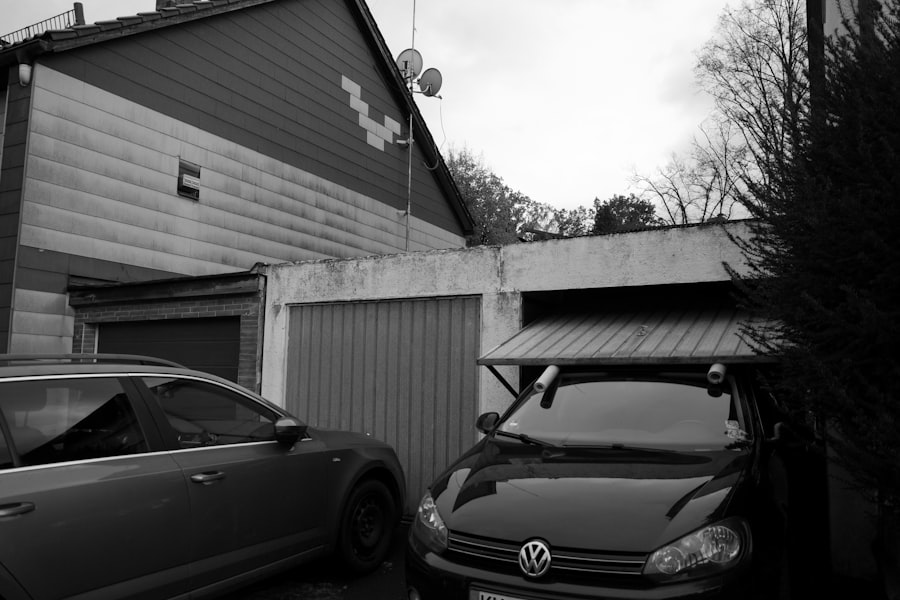In recent years, the term “corporate villain” has emerged as a descriptor for large corporations that have increasingly dominated the housing market. You may have noticed how these entities, often characterized by their profit-driven motives, have begun to overshadow traditional homeownership and community-oriented housing solutions. The rise of corporate landlords and investment firms has transformed the landscape of real estate, leading to significant consequences for individuals and families seeking stable housing.
As you delve into this topic, it becomes clear that understanding the role of these corporate players is essential to grasping the broader implications for society. The corporate villain in the housing market is not merely a fictional character; it represents a real and pressing issue that affects millions. You might find it alarming that these corporations often prioritize profits over people, leading to a myriad of challenges for communities.
As you explore the dynamics at play, you will uncover how these corporate entities contribute to displacement, gentrification, and a lack of affordable housing options. The consequences of their actions ripple through neighborhoods, affecting not just the housing market but also the very fabric of communities.
Key Takeaways
- Corporate villains play a significant role in the housing market, often contributing to displacement and gentrification.
- Their impact on affordable housing is detrimental, leading to a decrease in availability and an increase in prices.
- Corporate villains also contribute to housing market bubbles, influencing rental market prices and causing instability.
- The foreclosure crisis and homelessness are connected to the actions of corporate villains in the housing market.
- Lack of housing regulation allows corporate villains to further destabilize communities, affecting overall community stability.
The Role of Corporate Villains in Housing Market Displacement
As you examine the role of corporate villains in housing market displacement, it becomes evident that their influence is profound. These corporations often acquire large swaths of residential properties, converting them into rental units that cater to higher-income tenants. This shift can lead to the displacement of long-term residents who can no longer afford to live in their neighborhoods.
Moreover, the displacement caused by corporate villains is not just about financial strain; it also disrupts community ties and social networks. When you consider how these corporations operate, it becomes clear that they often lack a vested interest in the communities they inhabit.
Their focus on maximizing profits can lead to neglect of property maintenance and a disregard for tenant needs. As you reflect on this issue, you may begin to understand how corporate entities contribute to a cycle of instability that affects not only individuals but entire neighborhoods.
Corporate Villains and the Rise of Gentrification

Gentrification is another critical aspect of the corporate villain’s impact on housing markets. You may have witnessed firsthand how neighborhoods once characterized by affordability and diversity are transformed into upscale enclaves catering to wealthier residents. This phenomenon is often fueled by corporate investment in real estate, which can lead to increased property values and rents.
As you consider the implications of gentrification, it becomes clear that it is not merely an economic shift; it also represents a cultural and social upheaval. The role of corporate villains in gentrification is multifaceted. You might notice that these entities often engage in strategic marketing campaigns that promote neighborhoods as trendy or desirable, attracting affluent buyers and renters.
As a result, long-standing residents may find themselves priced out of their own communities, leading to a loss of cultural heritage and diversity. The consequences of gentrification extend beyond economics; they touch on issues of identity and belonging.
The Impact of Corporate Villains on Affordable Housing
| Corporate Villain | Impact on Affordable Housing |
|---|---|
| Gentrification | Displacement of low-income residents |
| Real Estate Speculation | Rising property prices |
| Unethical Landlord Practices | Forced evictions and poor living conditions |
| Corruption in Housing Policies | Decreased funding for affordable housing programs |
Affordable housing is a pressing concern in many urban areas, and corporate villains play a significant role in exacerbating this crisis. You may be aware that as corporations acquire more properties, they often prioritize luxury developments over affordable options. This trend can lead to a scarcity of affordable housing units, making it increasingly difficult for low- and middle-income families to find suitable living arrangements.
The consequences are dire, as many individuals are left with few choices but to compromise on quality or location. Additionally, corporate landlords may engage in practices that further undermine affordable housing efforts. You might find it troubling that some corporations exploit loopholes in housing regulations or engage in predatory lending practices that disproportionately affect vulnerable populations.
As you consider these dynamics, it becomes evident that the actions of corporate villains have far-reaching implications for housing accessibility and equity. The struggle for affordable housing is not just an economic issue; it is a matter of social justice.
Corporate Villains and the Housing Market Bubble
The housing market bubble is another area where corporate villains exert their influence. You may recall the events leading up to the 2008 financial crisis, where speculative investments in real estate led to widespread foreclosures and economic turmoil. Today, similar patterns are emerging as corporations invest heavily in residential properties, driving up prices and creating an unsustainable market environment.
As you analyze this situation, you might wonder whether history is repeating itself. The involvement of corporate villains in the housing market bubble raises concerns about long-term stability. You may recognize that when corporations prioritize short-term gains over sustainable practices, they contribute to volatility in the market.
This can lead to a cycle of boom and bust that ultimately harms both investors and everyday homeowners. As you reflect on this issue, it becomes clear that addressing the influence of corporate entities is crucial for fostering a more stable and equitable housing market.
The Influence of Corporate Villains on Rental Market Prices

The rental market has also been significantly impacted by the presence of corporate villains. You may have noticed how rental prices have skyrocketed in many urban areas, making it increasingly difficult for individuals and families to secure affordable housing. Corporate landlords often set rental rates based on market trends rather than tenant needs, leading to inflated prices that can strain household budgets.
As you consider this issue, it becomes apparent that the actions of these corporations have direct consequences for renters. Moreover, corporate landlords may employ tactics such as aggressive rent increases or evictions to maximize profits. You might find it concerning that these practices can create an environment of fear and instability for tenants who are already struggling to make ends meet.
The influence of corporate villains on rental market prices not only affects individual households but also contributes to broader societal issues such as homelessness and housing insecurity.
Corporate Villains and the Foreclosure Crisis
The foreclosure crisis serves as a stark reminder of the potential consequences of unchecked corporate influence in the housing market. You may recall how many families lost their homes during the financial crisis due to predatory lending practices and speculative investments by large corporations. Today, similar patterns are emerging as corporate entities continue to acquire distressed properties at bargain prices, often exacerbating existing inequalities in homeownership.
As you explore this issue further, you might consider how corporate villains contribute to a cycle of foreclosure and displacement. When corporations purchase foreclosed homes, they may prioritize profit over community stability, leading to neglect or mismanagement of properties. This can create a downward spiral where neighborhoods suffer from decreased property values and increased crime rates.
The connection between corporate actions and foreclosure outcomes underscores the need for greater accountability in the housing market.
The Connection Between Corporate Villains and Homelessness
The rise of corporate villains in the housing market has a direct correlation with increasing rates of homelessness across many urban areas. You may be aware that as affordable housing options dwindle due to corporate acquisitions and rising rents, more individuals find themselves without stable shelter. This crisis is not merely a result of personal circumstances; it is deeply intertwined with systemic issues perpetuated by corporate interests.
As you reflect on this connection, you might consider how homelessness is often viewed through a narrow lens that overlooks its root causes. The actions of corporate villains contribute to a broader narrative about housing insecurity and social inequality. By prioritizing profits over people, these entities exacerbate existing disparities and create barriers for those seeking stable housing solutions.
Addressing homelessness requires a comprehensive understanding of how corporate influence shapes the housing landscape.
Corporate Villains and the Lack of Housing Regulation
The lack of effective housing regulation is another critical factor enabling corporate villains to thrive in the market. You may have noticed how regulatory frameworks often lag behind the rapid changes occurring within the real estate sector. This gap allows corporations to exploit loopholes and engage in practices that undermine tenant rights and community stability.
As you consider this issue, it becomes clear that stronger regulations are necessary to hold corporate entities accountable for their actions. Moreover, the absence of robust regulations can lead to a race-to-the-bottom mentality among landlords, where profit maximization takes precedence over tenant welfare. You might find it troubling that many tenants lack basic protections against unjust evictions or exorbitant rent increases due to insufficient oversight.
The need for comprehensive housing policies that prioritize affordability and tenant rights cannot be overstated; without them, communities will continue to suffer under the weight of corporate greed.
The Corporate Villain’s Effect on Community Stability
The impact of corporate villains extends beyond individual households; it also threatens community stability as a whole. You may have observed how neighborhoods once characterized by diversity and cohesion are increasingly fragmented due to rising rents and displacement caused by corporate acquisitions. This erosion of community ties can lead to social isolation and decreased civic engagement among residents.
As you contemplate this issue further, you might consider how community stability is essential for fostering resilience and well-being among residents. When corporations prioritize profits over people, they undermine the very foundations that hold communities together. The loss of local businesses, cultural institutions, and social networks can create an environment where residents feel disconnected from one another, ultimately diminishing their quality of life.
Addressing the Corporate Villain’s Impact on the Housing Market
In conclusion, addressing the impact of corporate villains on the housing market requires a multifaceted approach that prioritizes community needs over profit motives. You may recognize that meaningful change will necessitate stronger regulations, increased accountability for corporate entities, and a commitment to preserving affordable housing options for all residents. By advocating for policies that promote equity and sustainability in housing, you can contribute to creating a more just society.
As you reflect on your role in this ongoing conversation about housing justice, consider how collective action can challenge the dominance of corporate villains in the market. Whether through grassroots organizing or supporting local initiatives aimed at preserving affordable housing, your efforts can help reshape the narrative around housing access and community stability. Together, we can work towards a future where everyone has access to safe, affordable housing—free from the influence of corporate greed.
In recent years, the housing market has been under intense scrutiny, with many pointing fingers at corporate entities for exacerbating the crisis. These corporate “villains” are often accused of driving up property prices and making homeownership unattainable for the average person. An insightful article on this topic can be found on How Wealth Grows, which delves into the impact of corporate investments on the housing market and explores potential solutions to mitigate these effects. For a deeper understanding, you can read the full article here.
WATCH NOW!🫢 Your Rent Is Rigged By Wall Street
FAQs
What is the corporate villain angle in the housing market?
The corporate villain angle in the housing market refers to the perception that large corporations and investors are driving up housing prices and making it difficult for regular individuals and families to afford homes.
How do large corporations impact the housing market?
Large corporations impact the housing market by purchasing a significant number of properties, which can lead to increased competition and higher prices for homebuyers. This can also reduce the availability of affordable housing for individuals and families.
What are some examples of corporate involvement in the housing market?
Examples of corporate involvement in the housing market include real estate investment trusts (REITs), private equity firms, and large property management companies that purchase and manage residential properties on a large scale.
What are the potential consequences of corporate involvement in the housing market?
The potential consequences of corporate involvement in the housing market include inflated housing prices, reduced affordability for homebuyers, and a decrease in the availability of affordable rental properties. This can contribute to housing inequality and displacement of local residents.
What are some proposed solutions to address the corporate villain angle in the housing market?
Proposed solutions to address the corporate villain angle in the housing market include implementing regulations to limit corporate property acquisitions, increasing affordable housing initiatives, and promoting policies that prioritize housing stability for local communities.
